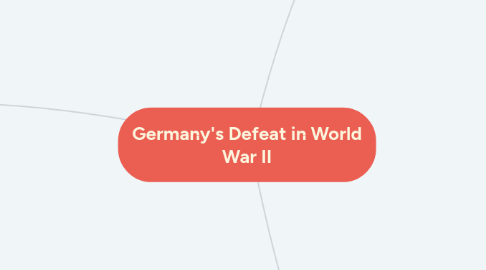
1. USA : Entry of USA into the war
1.1. Indirect involvment
1.1.1. cash and carrry
1.1.2. lend lease
1.1.3. arsenal of democracy
1.2. Collaboration with the Allies on Military Strategies
1.2.1. one of the first step to gain victory in Europe was to gain control over the Air and the Sea from the Germany
1.2.2. control of air was important because as the use of combat planes to support infantry and tank formations were essential to ensure victory of any battle
1.2.3. control of sea was important for the war in Europe because of Britain's precarious situation as an island nation. Britain had little resources of their survive and maintain its war effort.
1.2.4. USA's participation into WWII in Europe enabled the Allies to do this
2. Germany : weakness and miscalculations
2.1. Ineffective Command Sturcture
2.1.1. German state and military command structure suffered from a confusing system of overlapping authority
2.1.2. Hitler had ultimate authority to make all military decisions
2.1.3. often ignored the sound advice of his most experience generals
2.2. Inappropriate use of resources and military funds
2.2.1. Germany did not fully commit its resources and industries for war production
2.2.2. this resulted in slow and inefficient armament production
2.3. Heavy reliance on petroleum
2.3.1. Germany had very little petroleum reserves of its own, but it was the chief resource that powered its war machines
2.3.2. Germany invented synthetic oil by liquefying coal, a resource that Germany had in abundance
2.3.3. Germany also seized oilfields of Nazi-occupied countries (Austria/Romania) for its own use
2.3.4. problem - Germany started losing large supplies of oil from 1943 onward
2.4. War on two fronts
2.4.1. Up to mid-1941, Hitler conducted war only on one front: The Western Front
2.4.2. instead of invading Britain,Hitler decided to invade the USSR in 1941, breaking the Nazi-Soviet Pact
2.4.3. Hitler thought that the Soviets would crumble easily to his superior forces and that war would end quickly.
3. Allies : allied resistance (Britain / USSR / France)
3.1. British resistance to Germany
3.1.1. only country standing against Nazi-Germany in the early stages of WWII as France and Poland were quickly defeated by German forces
3.1.2. Germany needed to defeat Britain in order to bring the whole of Western Europe under its control
3.1.3. Britain managed to effectively resist Germany air and sea attacks through the tireless efforts of the British RAF and Royal Navy.
3.2. Reorganisation of the Soviet Union
3.2.1. USSR was invaded by Germany in June 1941, suffering heavy civilian and military losses
3.2.2. the combined effects of Russian Winters (1941/1941) and also Germany military errors allowed USSR to reorganised its army, rebuild its economy and military production
3.2.3. This was also made possible when USA provided material and money through the 1942 Lend-Lease programme
3.3. Resistance movement
3.3.1. their work was dangerous and they provided vital information and behind-the-lines support to the Allies
3.3.2. some examples of resistance movements : Yugoslav, Polish, Soviet and Free French Forces
